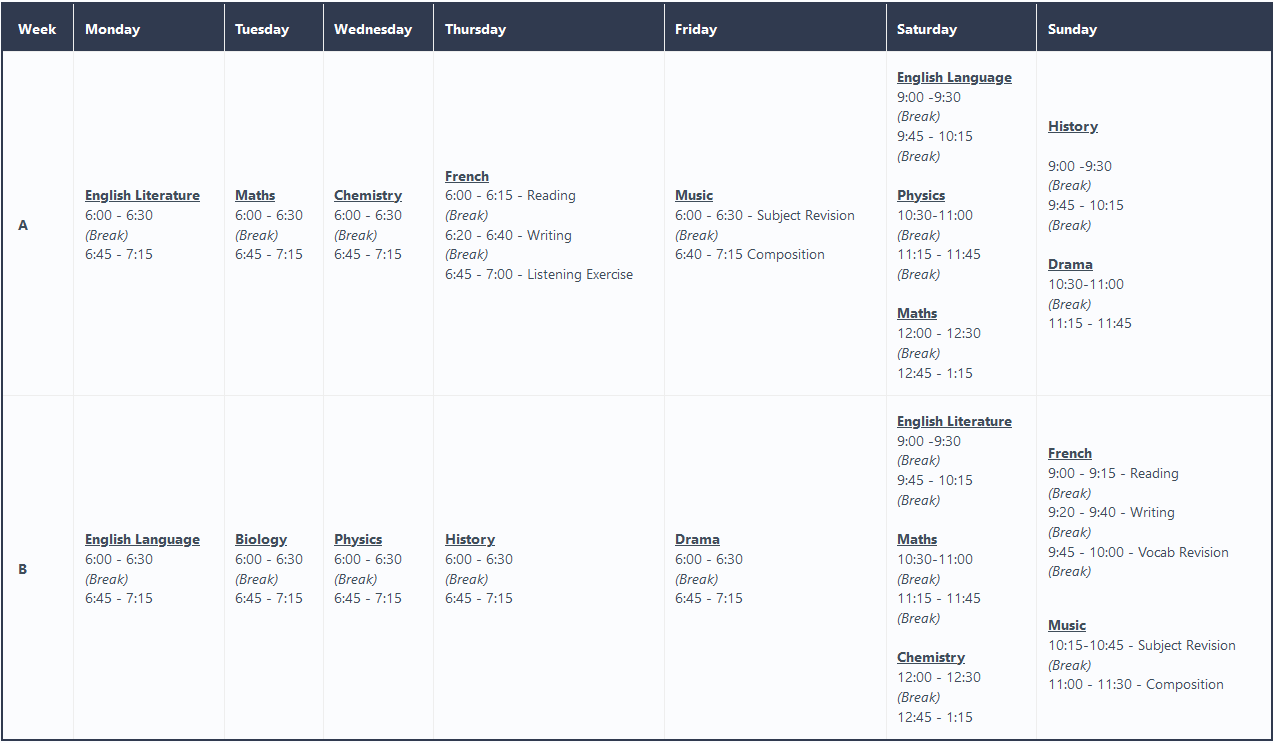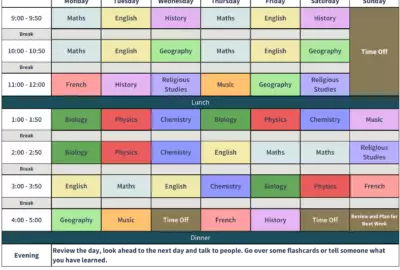
GCSEs are a pivotal moment for students as they enter a new phase of academic challenges and personal growth.
As these exams set you up for A Levels and University beyond, mastering GCSE revision is paramount. Students often struggle with the breadth of material to study, meaning they miss out on the depth of understanding required to access top grades.
Ivy Education experts have compiled this Ultimate Guide to help ease this journey by providing a myriad of tried-and-true revision techniques. In need of a little extra help? Ivy Education is your solution with their expert GCSE tutors, just a click away.
Need more help with your GCSEs?
What to Know Before Starting Your GCSE Revision
Knowing when to start revising, when study leave begins, and the exam dates help in crafting a well-timed study plan that doesn’t leave anything for the last minute!
Navigating through GCSE revision can be challenging, but with the right strategies, success is within reach. In this ultimate guide, Ivy Education provides a comprehensive roadmap to help students excel in their GCSE revision.
When Should GCSE Revision Start?
Revision begins at the beginning of Year 10! This may seem a long way in advance, but by keeping thorough notes at the end of each topic, you won’t be starting from scratch when it comes to preparing for the exams.
If you didn’t start at the beginning of year 10, don’t panic! Ivy Education’s GCSE tutors are experts at designing bespoke study plans to ensure you walk into the exam hall feeling confident in your knowledge.
When do GCSE Exams Begin?
GCSE exams in 2025 are scheduled to begin in May.
When Are GCSE Results Released?
GCSE exam results in 2025 will be released on August 21st.
2.0 Top
Understanding the GCSE Subjects
Review the official exam board syllabus
Every subject has its unique nuances, and the exam board's syllabus is your roadmap. Dive into this document to familiarise yourself with the detailed content of each subject. It outlines the required knowledge, skills, and understanding, ensuring you leave no stone unturned in your preparation.
Identify key themes and topics in each subject
Within the syllabus, there are often themes and topics that carry more weight. Recognise these core areas and prioritise your revision accordingly. This doesn't mean neglecting less prominent topics, but rather understanding where to focus your efforts more intensely.
Understand the format and structure of the exams
Beyond the content, knowing how the exams are structured is crucial. This includes understanding the types of questions you'll encounter, the exam layout, and the marking scheme.
Familiarity with the format helps in tailoring your revision method to the exam style, aiding in better time management and answer precision during the actual exams.

Setting a Revision Timetable
Start planning early
Planning ahead is essential, and we have Ivy Education specialists who can help you design a bespoke study plan based on your mock results.
By giving yourself the full 5 months from January to May, you have the opportunity to structure your revision based on which subjects you find most difficult and need a little extra attention, as well as factoring in any personal commitments.
Allocate specific time slots for each subject
Everyone has their favourite subject – and least favourite – which is why it is important to take into consideration which subjects will need more time than others.
Maybe maths comes naturally to you, but Spanish is a bore! In this case, it might help to commit extra time to ensuring you feel confident in every subject.
Include short breaks and leisure time
No one wants to miss out on something fun because they haven’t got their revision done - which is why we suggest scheduling “downtime” to avoid burnout.
You’re not a machine! Remember to sleep and eat well, and find solidarity in your friends who are probably just as sick of revision as you!
See below to find an example of a revision timetable:

Revision Techniques
Use flashcards for quick recall
Spaced repetition is key to learning those annoying facts and formulas that just have to be learnt by heart.
Practice with past papers
Practice makes perfect! In reality, there are only so many ways an examiner can test you on the syllabus content, therefore, by making yourself familiar with every style of question, chances are nothing will come as a surprise.
Teach concepts to someone else
Your friends aren’t your competitors! They are your allies! Remember this – teamwork makes the dream work!
Find a friend you work well with (not someone who will distract you) and sit down to quiz each other. Maybe they struggle with a topic you have mastered – take turns being teacher to see how much you really know.
Create mind maps for complex topics
Visualising how topics relate to each other helps when it comes to recalling and structuring essays. Use colours, do it on paper, do it on the computer, an iPad, or cover your bedroom wall with sticky notes, whatever works for you.
Use mnemonics for memorisation
They’re super annoying but will probably be stuck in your head forever. The funnier the better.
Adopt the Pomodoro Technique
If you’re struggling to get started or caught in a study rut, set a 20-minute timer and concentrate on one topic for that time. Take a 5-minute break. Then, another 20 minutes of study time. Take a longer break after a cycle of 4 study-break intensives and hopefully, you’ll be pleasantly surprised about how productive you can be.
2.3Maintaining Well-being During Revision
Maintain a healthy diet
Fuel your body with healthy snacks to optimise your brain function.
Ensure adequate sleep
Chances are if you stay up late cramming, you won’t remember a thing the next morning. Invest in your sleep, and you will reap the rewards the next morning with improved productivity and concentration.
Take short, frequent breaks
Regularly stepping away from your studies is crucial for maintaining mental sharpness. Schedule short, frequent breaks throughout your revision schedule to recharge. During these breaks, avoid screens and engage in relaxing activities like stretching, walking, or meditating.
This will help prevent burnout and enhance your focus and retention when you return to studying. Otherwise, you can use the Pomodoro method to break work into intervals so you can have frequent breaks.
Practice mindfulness or stress-relief techniques.
There’s no one-size-fits-all all approach to self-care but take some time to work out what works for you – this might be exercise, reading,
2.4Utilising Resources and Support
Revise with someone else
Find a friend who won’t distract you. Set a timer so you both study for 20 minutes and then take a 5-minute break to chat, have a snack and compare notes. Repeat.
Organise your notes
Any excuse to buy new stationary, right?
Utilise online resources and apps
Memrise and Quizlet are great for making flashcards for testing yourself on key facts – but don’t waste time on making everything from scratch, search for your exam board and utilise resources that already exist.
Get a GCSE Tutor
Your schoolteachers might be offering some extra recap sessions – take advantage of these before you go on study leave.
Alternatively, it might be best to get a GCSE tutor to help you with your revision. Luckily, we have some great ones here.
Use educational videos and podcasts for learning
Utilise the fact that other people have studied most content before and seek out pre-made resources to boost your productivity.
Listen to study materials while doing something else – cooking, sitting on the bus, or on a walk – and absorb the content subconsciously.
2.5Last-Minute Revision Tips
Focus on weak areas
Mock results and end of unit tests are really useful for highlighting what went well, and where you can improve. Don’t focus too much on the grades, but rather look at the papers themselves to help you identify which styles of questions or topic areas you need some more time on.
Review summary notes
Remember those beautifully organised and presented notes you’ve been keeping since the beginning of year 10? It’s now time to dig those up and whip out the highlighters.
Or, if you didn’t quite get around to it in the first place, then there are some wonderful revision guides, like those written by CGP, with summary notes for almost every exam board.
Avoid cramming new information
Some say that if you sleep with your textbook under your pillow the night before an exam, the information will pass into your brain by osmosis, or maybe its diffusion… either way, if you’re trying to cram the night before, you might be too late!
Stay hydrated and rested
Fuel your brain and keep hydrated. Healthy snacks ensure top-tier brain performance. By keeping clear boundaries between your study and socialising time you can boost productivity and make each day more manageable.
Keep a positive mindset
Remember exams won’t last forever, this is a short and intense period that you will get through with the support of your friends, family and teachers. Chances are you will never have to study for such a wide range of subjects again in your life. Spend some time making fun summer plans so you have something to look forward to at the end. You will more than deserve it.
2.6Get a Tutor
Solid revision skills and exam technique are important, but so are the “soft skills” of looking after your mental well-being and keeping motivated.
Rather than rote memorisation, an Ivy Education tutor can ensure you really understand the mechanisms behind a topic, which helps with recall as well as pushing your analysis towards the top grades.
While teachers in school teach the class, an Ivy Education tutor can devise specific examples to cater to a student’s unique learning style, enabling them to learn both more deeply and at a faster rate.
Our tutors know each exam board’s specific syllabus and question style inside out to ensure that there are no nasty surprises on the day. Beyond revision skills and exam technique, Ivy Education tutors will provide you with the strategies necessary so that you walk into the exam hall feeling calm and confident.
Ready to take your GCSE revision to the next level?
Learn more about our GCSE Tuition and see how we can help you succeed in your exams.
3.0 Top
FAQ's
The best way to start revising for GCSEs is to begin early and keep thorough notes throughout your GCSE course. Create a comprehensive study plan, understand the exam syllabus, and focus on key themes and topics. Build upon your strengths and weaknesses from your mocks to inform your approach to the exam season.
There’s no magic answer to this question - the amount of time spent revising each day can vary, but a general guideline is to allocate specific time slots for each subject.
Aim for a balanced approach, incorporating short breaks and leisure time to avoid burnout. Quality is key, so focus on productive and focused study sessions.
Effective revision techniques include reviewing the official exam board syllabus, identifying key themes, and understanding the format of exams.
Additionally, creating a well-structured revision timetable, using tools like flashcards and mind maps, practising with past papers, and incorporating the Pomodoro Technique can enhance your productivity and overall revision process.
Staying motivated during GCSE revision involves setting realistic goals, celebrating small achievements, and maintaining a positive mindset. Break down your revision into manageable tasks, visualise success, and reward yourself for progress.
Surround yourself with a supportive environment and remember that while the exam period is stressful, it's only temporary. All your hard work will pay off when you keep your long-term goals in mind.
Past papers are highly important in GCSE revision as they provide a practical understanding of the exam format, question types, and time management. Practising with past papers helps you familiarise yourself with the style of questions and identify areas that may need additional attention.
Try these in both relaxed and exam conditions can help you get the feel of sitting a real exam so that it is not an unfamiliar environment when it comes to taking the real thing.
Managing stress during the GCSE revision period is essential for being on top form for every exam. Incorporate regular physical exercise, maintain a balanced diet, ensure sufficient sleep, and take short, frequent breaks.
Practice mindfulness or stress-relief techniques, and remember that seeking support from friends, family, or teachers is crucial. Regular socialisation and recreational activities can help you relax.
Knowing that you have done an adequate amount of preparation can be a massive weight off your shoulders.
While balance is important, we suggest that you prioritise subjects based on individual strengths and weaknesses. Allocate more time to subjects that require additional attention while maintaining a reasonable level of revision for all.
Consider seeking guidance from teachers or a tutor to tailor your approach to each subject's demands – don’t leave your least favourite subject until last! Our tutors can make a custom revision plan catered to your individual needs!
4.0 Top
Conclusion
Ivy Education’s tutors can help you elevate your preparation, ensuring that you enter the exam hall with competence and confidence. Plan ahead, stay motivated, and let Ivy Education be your study partner to help you towards GCSE success.
It’s never too late to get started on your academic journey, and with the right tools, and guidance, you will be well-equipped to conquer the challenges that lay ahead.
Need more help?
We offer expert GCSe and iGCSE Tutors to help you ace your GCSE exams. Find out more below.
View GCSE TutorsOther Articles

IGCSE vs GCSE: Differences You Should Know in 2025

What are IGCSEs?

Free GCSE Revision Timetable Template

GCSE Maths Exams Explained

How to Revise GCSE Maths

How to Get All 9s in your GCSEs?

How to Revise for English Literature GCSE
As featured in











